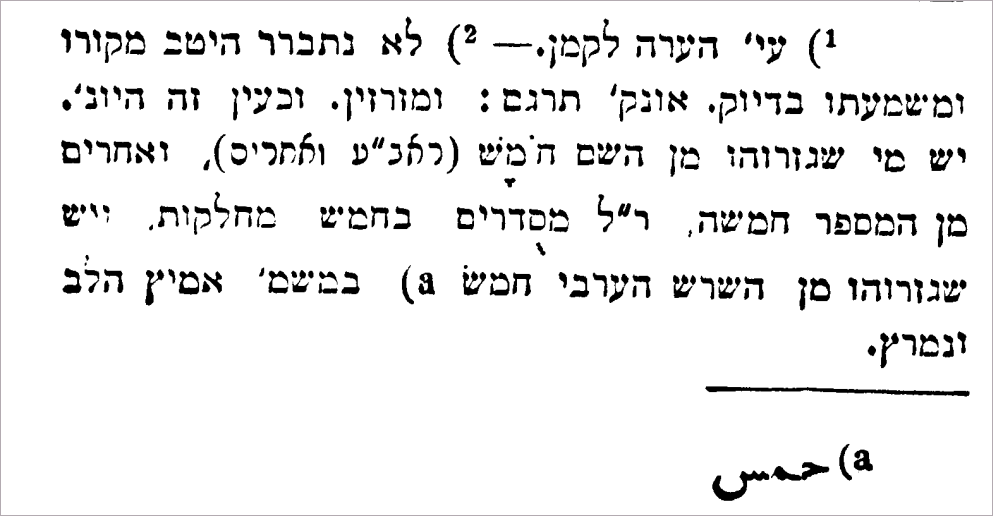This post is part of a series about words from Kohelet, in honor of the release of my new book, Kohelet - A Map to Eden. For more information about the book, and how to get a discount for your purchase, see this Balashon entry.
A word that only appears in Kohelet is the adjective takif תַּקִּיף:
מַה־שֶּׁהָיָה כְּבָר נִקְרָא שְׁמוֹ וְנוֹדָע אֲשֶׁר־הוּא אָדָם וְלֹא־יוּכַל לָדִין עִם (שהתקיף) [שֶׁתַּקִּיף] מִמֶּנּוּ׃
"Whatever happens, it was designated long ago and it was known that it would happen; as for man, he cannot contend with what is stronger than he." (Kohelet 6:10)
(The
kri reading -
takif - is preferred over the
ketiv התקיף. And while
this concordance considers the
ketiv as a verb, most scholars see it as an adjective as well - either as a compound of שהוא תקיף or as Gordis suggests, a conflation of עם התקיף and עם שתקיף - "with the One mightier than he." See Gordis, p. 263).
The word comes from the root תקף, which only appears a few other times in the Tanakh, all in books featuring later Biblical Hebrew. It appears once more in Kohelet as a verb (4:12) meaning "to attack." In Iyov 14:20 and 15:24, the verb means "to overpower." It also appears as a noun, tokef תֹּקֶף in Daniel 11:17 and Esther 9:29 & 10:2, meaning "strength, might, power". This noun later took on the more specific meaning of "authority" in Rabbinic Hebrew, and today also means "validity, legality."
All of these together - the adjectives, verbs, and nouns - express a sense of strength and power. And there is consensus among linguists that the few Hebrew mentions in the Tanakh were borrowed from or influenced by Aramaic (and in the Aramaic sections of the Tanakh it appears as well.)
Klein expands on this in his etymology:
BAram. תְּקַף (= was strong), Aram.–Syr. תְּקֵף (= was strong, prevailed), which is related to Nab. תקף (= authority). Many scholars connect Aram.–Syr. תּֽקֵף with Arab. thaqafa (= he attained to, overtook, overpowered). However, in this case the base would be שׁקף in Hebrew (Arab. th corresponds to Heb. שׁ). Haupt connects this base with Akka. pashqu (= arduous), pushqu (= hardship, necessity).
His rejection of the connection to Arabic thaqafa is earlier found in the Ben Yehuda dictionary. Despite the standing of those sources, I found others who do maintain a connection (Even-Shoshan and BDB for example.)
The Arabic cognate root means "to be clever, smart" or "to educate." I think the best parallel in English would be the word "mastery," which means "to be in control, dominant" over both places and people (which is how the root תקף is expressed in Hebrew) and over a a realm of knowledge (in the Arabic sense.)
The Comprehensive Aramaic Lexicon provides another interesting cognate in Arabic. In the entry for the Aramaic root tqp - "to be strong" many Biblical and post-Biblical occurrences (such as in the Talmud and translations in the Targum) of תקף are cited. The end of the entry contains this note:
Not in Old Aramaic, where the original etymon yqp (=Arabic wqf, "to stand, withstand") still occurs. This accounts for the later form אתוקף, from which the simplified root tqp developed.
This would make takif cognate with the Arabic waqf. That term is known in Israel as the Jordanian organization that manages the Islamic sites on the Temple mount. But more generally, a waqf is an endowment made by a Muslim to a religious cause, and literally means "stoppage, immobilization," since the donated money or property cannot move from that dedication (similar to the Jewish hekdesh).
Therefore, according to the theory suggested in the CAL above, the root ykp - "to stand, withstand", eventually came to be tkp - "to be strong."
If this is the case, then takif may have another Hebrew cognate. In his entry for the root נקף, meaning "to go round," Klein provides the following etymology:
Aram. אַקִּיף (= he surrounded), Syr. נְקֵף (= he clung to, stuck to, was joined), Arab. waqafa (= he stood still).
Stahl makes a similar argument in his Arabic etymological dictionary in his entry for וקף, citing Yeshaya 29:1 חַגִּים יִנְקֹפוּ - "the festivals circling round." He goes on to compare this concept of the holidays to another term used for them in Tanakh - atzeret, which like waqf, also means "stoppage." (I must concede that I don't fully understand Stahl's explanation which seems to link "stopping" with "circling", and says that both were likely originally dancing terms. Perhaps he means that instead of moving forward, the root indicated assembling together, surrounding one spot, and stopping.)
Among the Hebrew words deriving from נקף include hakafa הַקָּפָה - "encirclement" (and the dancing done on Simchat Torah, i.e., Shemini Atzeret) and hekef הֶקֵּף - "perimeter, circumference."
And perhaps most surprisingly, Klein also links נקף to tekufa תְּקוּפָה. Originally meaning "circuit, revolution", since it was applied to the revolution of the sun, it came later to mean "season," and then "period, epoch, era."
Looking at takif and tekufa in Hebrew - תקיף and תקופה, it might appear that they come from the same root: תקף. That is certainly not the case - the latter comes from נקף, not תקף. But a little digging has shown us that while not siblings, takif and tekufa may indeed be cousins.





